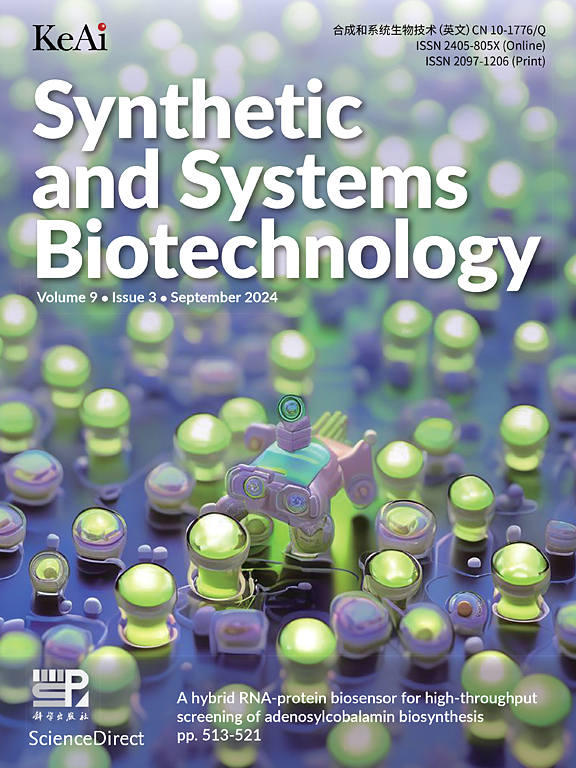System-level characterization of engineered and evolved formatotrophic E. coli strains
IF 4.4
2区 生物学
Q1 BIOTECHNOLOGY & APPLIED MICROBIOLOGY
引用次数: 0
Abstract
One-carbon compounds, such as formate, are promising and sustainable feedstocks for microbial bioproduction of fuels and chemicals. Growth of Escherichia coli on formate was recently achieved by introducing the reductive glycine pathway (rGlyP) into its genome, which is theoretically the most energy-efficient aerobic formate assimilation pathway. While adaptive laboratory evolution was used to enhance the growth rate and biomass yield significantly, still the best performing formatotrophic E. coli strain did not approach the theoretical optimal biomass yield of the rGlyP. In this study, we investigated these previously engineered formatotrophic E. coli strains to find out why the biomass yield was sub-optimal and how it may be improved. Through a combination of metabolic modelling, genomic and proteomic analysis, we identified several potential metabolic bottlenecks and future targets for optimization. This study also reveals further insights in the evolutionary mutations and related changes in proteome allocation that supported the already substantially improved growth of formatotrophic E. coli strains. This systems-level analysis provides key insights to realize high-yield, fast growing formatotrophic strains for future bioproduction.
工程和进化形成营养型大肠杆菌菌株的系统级特性
单碳化合物,如甲酸酯,是微生物生产燃料和化学品的有前途和可持续的原料。最近,通过在大肠杆菌基因组中引入还原性甘氨酸途径(rGlyP),大肠杆菌实现了对甲酸的生长,这在理论上是最有效的有氧甲酸同化途径。虽然采用适应性实验室进化方法显著提高了生长速率和生物量产量,但表现最好的formatotrophic大肠杆菌菌株仍未接近rGlyP的理论最佳生物量产量。在这项研究中,我们研究了这些先前改造过的形成营养型大肠杆菌菌株,以找出生物量产量不理想的原因以及如何提高生物量产量。通过代谢建模、基因组学和蛋白质组学分析的结合,我们确定了几个潜在的代谢瓶颈和未来的优化目标。该研究还揭示了进化突变和蛋白质组分配相关变化的进一步见解,这些变化支持了形式营养型大肠杆菌菌株已经大大改善的生长。这种系统级分析为实现未来生物生产的高产、快速生长的营养型菌株提供了关键见解。
本文章由计算机程序翻译,如有差异,请以英文原文为准。
求助全文
约1分钟内获得全文
求助全文
来源期刊

Synthetic and Systems Biotechnology
BIOTECHNOLOGY & APPLIED MICROBIOLOGY-
CiteScore
6.90
自引率
12.50%
发文量
90
审稿时长
67 days
期刊介绍:
Synthetic and Systems Biotechnology aims to promote the communication of original research in synthetic and systems biology, with strong emphasis on applications towards biotechnology. This journal is a quarterly peer-reviewed journal led by Editor-in-Chief Lixin Zhang. The journal publishes high-quality research; focusing on integrative approaches to enable the understanding and design of biological systems, and research to develop the application of systems and synthetic biology to natural systems. This journal will publish Articles, Short notes, Methods, Mini Reviews, Commentary and Conference reviews.
 求助内容:
求助内容: 应助结果提醒方式:
应助结果提醒方式:


